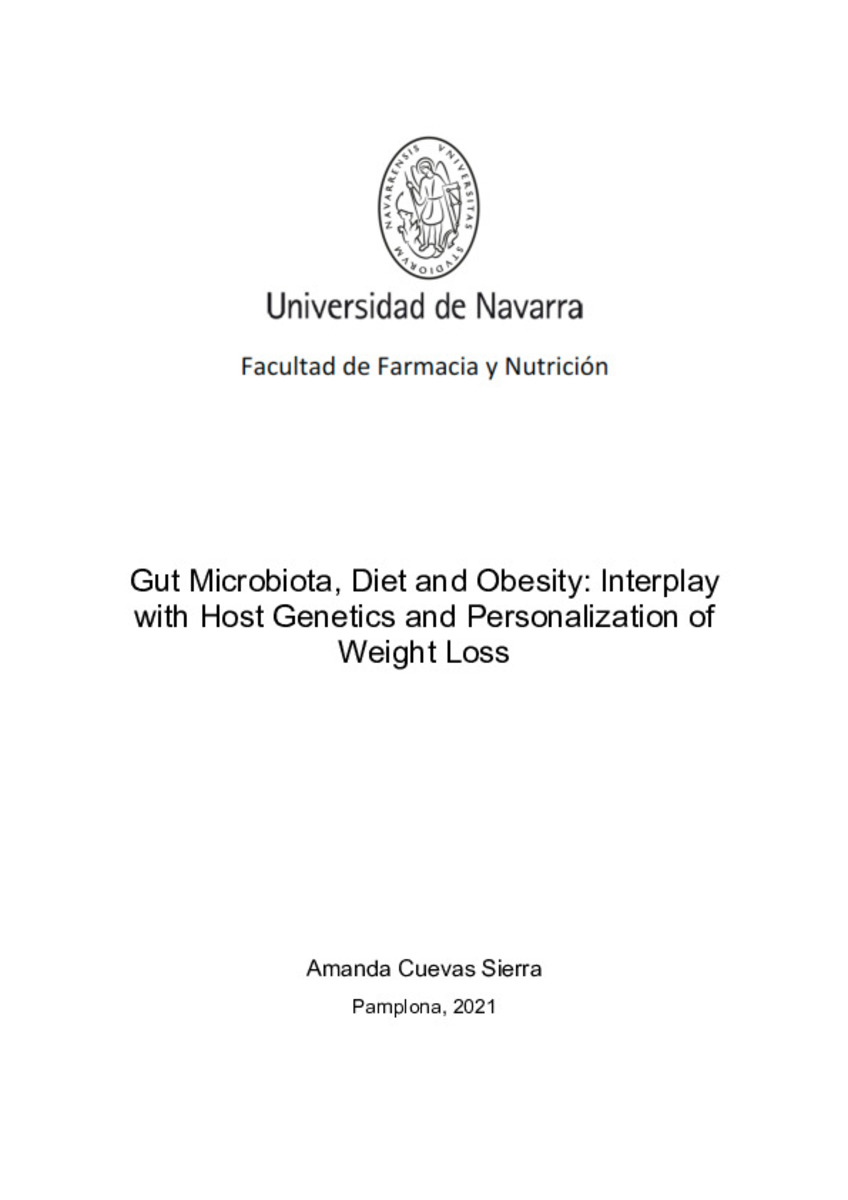Full metadata record
| DC Field | Value | Language |
|---|---|---|
| dc.contributor.advisor | Milagro-Yoldi, F.I. (Fermín Ignacio) | - |
| dc.contributor.advisor | Riezu-Boj, J.I. (José Ignacio) | - |
| dc.creator | Cuevas-Sierra, A. (Amanda) | - |
| dc.date.accessioned | 2022-01-12T07:56:03Z | - |
| dc.date.available | 2022-01-12T07:56:03Z | - |
| dc.date.issued | 2022-01-12 | - |
| dc.date.submitted | 2021-12-16 | - |
| dc.identifier.citation | CUEVAS, Amanda. "Gut microbiota, diet and obesity: interplay with host genetics and personalization of weight loss". Milagro, F.I. y Riezu, J.I. (dirs.). Tesis doctoral. Universidad de Navarra, Pamplona, 2021. | es_ES |
| dc.identifier.uri | https://hdl.handle.net/10171/62707 | - |
| dc.description.abstract | Gut microbiota is a complex ecosystem composed by the microorganisms that inhabit in the human gut. These microorganisms exert an influence on the host homeostasis and may be affected by host and environmental factors, specially by the type of diet. Altered gut bacterial composition (dysbiosis) has been associated with the development of many diseases, including obesity. In this sense, the present work aimed to evaluate the interaction between host genetics and microbiota in obesity, the effects of dietary components (ultra-processed foods, UPFs) and weight loss process on microbiota composition and the use of integrative models using microbiota information for the prescription of personalized weight loss diets. This research was carried out in subjects with overweight and obesity from the Obekit trial. In the first chapter, we performed a review that summarizes the current understanding of the relationship between the gut microbiota and the development of obesity, as well, the use of novel approaches as modulators (prebiotics, probiotics and fecal microbiome transplantation). In chapter 2, we evaluated the interactive associations between gut microbiota and a genetic risk score (GRS) constructed with 10 SNPs associated with body mass index (BMI). Prevotellaceae family was found associated with BMI and GRS in women. These findings suggest relevant interrelationships between Prevotellaceae and the genetic background that may determine interindividual BMI differences in women. In chapter 3, differences in gut microbiota composition were found according to UPFs consumptio nwhen comparing people who consumed less than 3 UPFs per day and more than 5, suggesting that UPFs have an impact on gut microbiota composition. Moreover, these changes in gut microbiota were different between men and women, showing that the impact of UPF on microbiota may be sex-dependent. In chapter 4, gut microbiota composition was analyzed before and after a weight loss intervention using a moderately high-protein (MHP) or a low fat (LF) diet. The changes in gut microbiota that accompanied weight loss were different between both diets, but also between men and women, showing that changes in microbiota composition after weight reduction occurred in a diet and sex-dependent manner. In addition, differences in bacterial metabolic pathways after weight loss were also found. Lastly, in chapter 5 we aimed to perform an integrative mixed model that combines baseline gut microbiota with a genetic score, which helps to decide the best type of diet for a successful weight loss. This model was constructed using a microbiota score associated with BMI loss for women, and a different microbiota score for men, showing that the success of a weight loss treatment could be estimated using gut microbiota composition and genetic information. Overall, the results of the present thesis show that gut microbiota composition interacts with host genetics for determining the interindividual differences in BMI and is affected by several factors including dietary components (UPFs consumption) and weight loss. Moreover, this work shows that gut microbiota could be used as a potential biomarker for the prescription of the best type of diet for a successful weight loss. Interestingly, different results were obtained between men and women in gut microbiota, showing that gut microbiota could be affected by host genetics, UPFs and weight loss, but also by sex-related factors. Considering all these factors, they could help to improve the personalization of weight loss advice | es_ES |
| dc.language.iso | spa | es_ES |
| dc.publisher | Universidad de Navarra | es_ES |
| dc.rights | info:eu-repo/semantics/openAccess | * |
| dc.subject | Gut microbiota | es_ES |
| dc.subject | Diet | es_ES |
| dc.subject | Obesity | es_ES |
| dc.subject | Weight loss | es_ES |
| dc.subject | Weight loss diets | es_ES |
| dc.subject | Microbiota | es_ES |
| dc.subject | Ciencias de la nutrición | - |
| dc.subject | Microbiología | - |
| dc.subject | Biología humana | - |
| dc.title | Gut microbiota, diet and obesity: interplay with host genetics and personalization of weight loss | es_ES |
| dc.type | info:eu-repo/semantics/doctoralThesis | es_ES |
Files in This Item:
Statistics and impact
Items in Dadun are protected by copyright, with all rights reserved, unless otherwise indicated.






